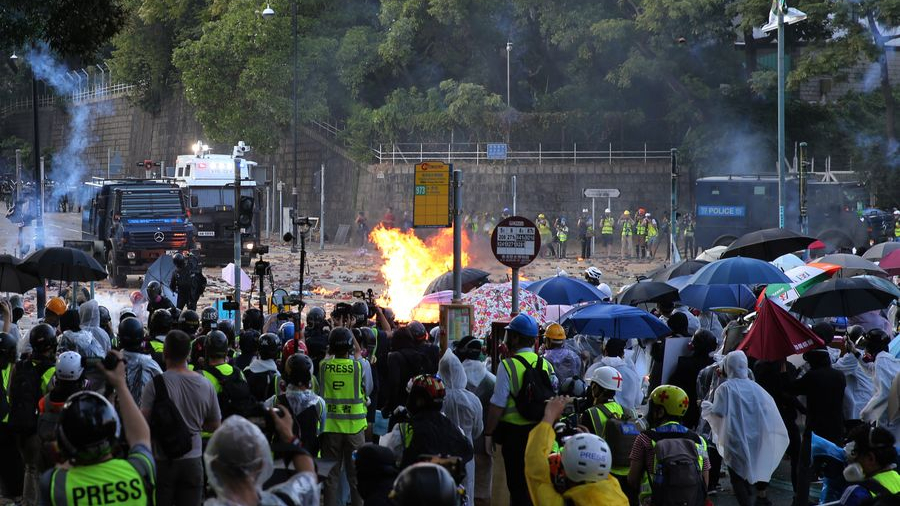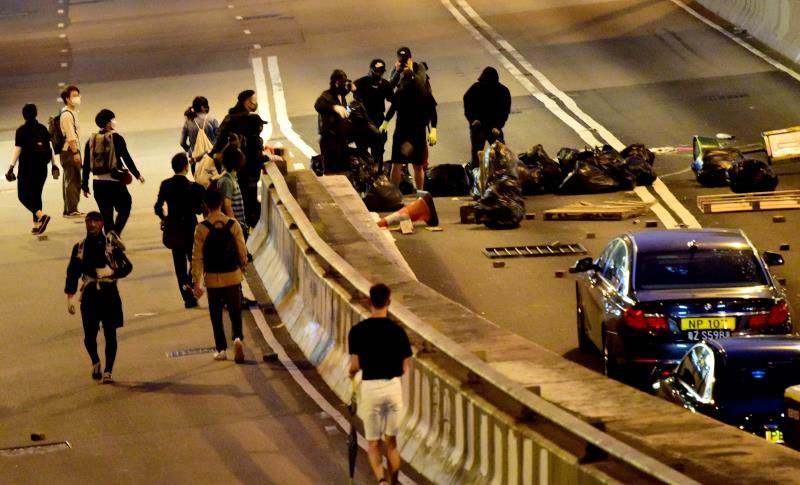
Rioters set fire on roads outside of Hong Kong Polytechnic University, China, November 17, 2019. /Xinhua Photo
Rioters set fire on roads outside of Hong Kong Polytechnic University, China, November 17, 2019. /Xinhua Photo
Editor's note: Tom Fowdy is a British political and international relations analyst and a graduate of Durham and Oxford universities. He writes on topics pertaining to China, the DPRK, Britain and the United States. The article reflects the author's opinions, and not necessarily the views of CGTN.
For the past few days there has been rolling mainstream media coverage of events at Hong Kong Polytechnic University, with students having transformed the campus into a base of operations and subsequently battled police who sought to enter, using petrol bombs, arrows and other weapons.
As the drama unfolded, Hong Kong activists, including leading figures such as Joshua Wong, continually claimed on social media that they were on the verge of being killed. The drama ended the next morning with no fatalities.
This raises a point about the political culture of Hong Kong demonstrators. While inevitably the heat of tense situations induces panic in human nature, there is a notable element of mass hysteria and extreme exaggeration present in this movement, and long prior to it.
In doing so, they have persistently inflated allegations against the police, despite huge evidence to the contrary, sometimes even to the point of pure falsehood, all driven by the underlying goal to gain international support by framing themselves as "martyrs."
When I lived in Hong Kong, I observed an underlying culture of mass hysteria predominant among students, and thus the precursors of those behind the disruption today.
Fears of Beijing and local authorities were artificially high to the point of irrationality, often manifesting in a McCarthyist and red scare like fashion. As a notable memory, the Hong Kong University Executive Committee had made a new appointment that was deemed by students to be "pro-Beijing." This led to an uproar on campus.

Rioters block road in Central district in Hong Kong, China, November 12, 2019. /Xinhua Photo
Rioters block road in Central district in Hong Kong, China, November 12, 2019. /Xinhua Photo
That evening, demonstrators decided to attack the committee by aggressively blockading a building where they were meeting, preventing them from leaving. The police were forced to disperse the crowd.
Later, then Vice Chancellor Peter Matthieson strongly condemned their behavior. There was no greater case study as to how the local psyche was driven by a hysterical fear which repeatedly exerted itself into unreasonable behavior which was deemed justified.
This mindset has come to the forefront of the events we see today. Some Hong Kong people wildly exaggerate concerning the police and authorities, despite the fact that in practice law enforcement has not actually killed a single protester in any context.
It is hysteria, but hysteria induced with the view of opportunism. The protesters have killed, but the police have not. Law enforcement is consistently misrepresented as political oppression. A graffiti slogan on a roadside once photographed read: "Who do you call when the police kills?" but the statement is an absolute falsehood.
That's accompanied by bizarre "fake news" like rumors sweeping the city that the police have killed people and covered it up, and even extreme stories that they were sexually assaulting protesters in MTR stations, none of which have even a grain of truth or shred of evidence to them.
In doing so, an underlying tactic behind such hysteria is to sell it to the Western media in order to ferment international support for their movement; with activists believing to succeed they need to frame themselves as "martyrs" accordingly. Thus, every confrontation is misleadingly framed as oppression by the police.
This all builds into the events of the last few days. Activists persistently claimed on social media that the events at Hong Kong Polytechnic University were a prerequisite to a massacre by police, a tweet by one journalist read "students and protesters at PolyU are now posting their last words on social media because they expect to die tonight."
Joshua Wong also claimed this. Yet by the morning, it all looked truly ridiculous, exposing this nonsensical mindset for what it is. However, the Western media circus had already followed suit, giving it attention and recognition it didn't reserve.
So what are the underlying takeaways here? There is an overwhelming level of mass hysteria and exaggeration present in coverage of events in Hong Kong. It is sometimes irrational, but in many cases it is opportunistic with the goal of establishing protesters as martyrs facing persecution, which selectively takes responses by the police out of context and of course ignores the behavior of activists who intentionally bait for such a response and then exaggerate it.
Thus, do not let ideological biases get in the way of an empirical view of what is happening here. Mass hysteria, exaggeration and even deception are prevailing trends in how this movement conducts and presents itself.
The Western media and public keep falling for it. But after the premise of huge claims being made about Hong Kong Polytechnic University, and then nothing happening in the end, people should wake up and see this for what it really is: Hysteria.
(If you want to contribute and have specific expertise, please contact us at opinions@cgtn.com.)